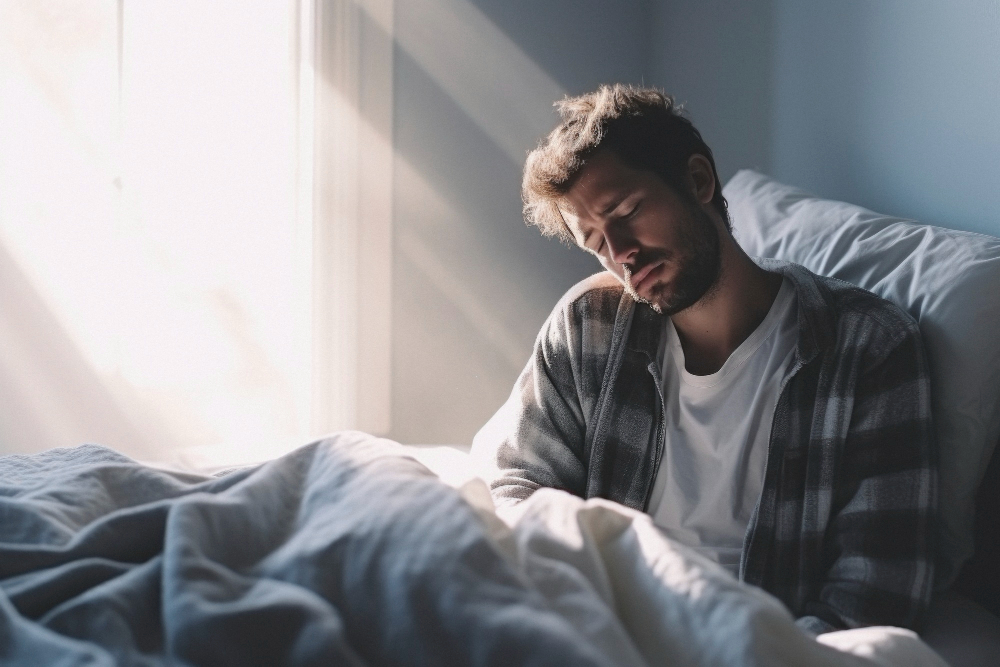The alarm goes off, you swing your legs out of bed, and suddenly you’re moving like the Tin Man from The Wizard of Oz—all creaky joints and stiff limbs. Your knees protest as you stand, your back feels like it’s been locked in place all night, and your fingers seem to have forgotten how to bend properly.
Millions of Americans wake up feeling like they’ve aged twenty years overnight, only to have that stiffness mysteriously fade away after they’ve been moving around for a while. But here’s what might surprise you: the real culprit behind your morning stiffness might not be your joints at all.
The Mystery of Morning Stiffness—It’s More Common Than You Think
Before we dive into what’s really happening, let’s acknowledge something important: morning stiffness is incredibly common. Whether you’re 25 or 75, chances are you’ve experienced that “morning gel” phenomenon where your body feels like it needs a good ten minutes to remember how to function properly.
Age causes the cartilage that cushions your joints to dry out. And your joints make less of the synovial fluid that adds lubrication, causing you to feel stiff and sore. This natural process affects everyone to some degree, but the intensity and duration can vary wildly from person to person.
What’s fascinating is that many people assume their joints are the problem, when in reality, several other factors might be playing a much bigger role in how you feel when you first wake up.
Plot Twist: Your Mattress Might Be the Real Villain
Here’s where things get interesting. While we’re quick to blame our joints for morning stiffness, one of the biggest factors might be something we spend eight hours on every single night—our mattress and sleep position.
When a person does not sleep in a way that aligns the spine and keeps their neck in a neutral position, they may wake up feeling stiff or achy. Think about it: if you’re spending a third of your life in a position that puts stress on your muscles and joints, those eight hours of poor alignment can set the tone for how you feel the moment you wake up.
Your sleep position matters more than you might realize. Side sleepers who always favor one side might find that side feeling particularly stiff in the morning. Stomach sleepers often wake up with neck and back stiffness because this position forces the spine into an unnatural curve. Even back sleepers can experience issues if their pillow setup doesn’t properly support the natural curve of their neck.
The wrong mattress can compound these problems. A mattress that’s too soft might not provide enough support, allowing your body to sink into positions that create pressure points and misalignment. Too firm, and you might not get the contouring you need to relieve pressure on sensitive areas like hips and shoulders.
The Inactivity Factor—Why “Motion is Lotion”
Here’s another piece of the puzzle that often gets overlooked: the simple fact that you’ve been still for hours. “Motion is lotion, too, so staying active will help keep your joints lubricated and working efficiently.”
During sleep, your joints essentially go into “power save mode.” The synovial fluid that helps lubricate your joints isn’t circulating as actively, and your muscles and connective tissues can tighten up from hours of inactivity. It’s similar to how a car engine might feel a bit rough when you first start it on a cold morning—everything just needs a moment to warm up and get moving again.
However, inactivity can make joints stiff. It is important to do some gentle exercise every day to prevent weak muscles, stiff tendons, and stiff joints. This is why that morning stiffness often resolves itself once you start moving around. Your body is literally warming up and getting its systems back online.
The Hydration Connection You Never Considered
Here’s something that might surprise you: your hydration levels can significantly impact how stiff you feel in the morning. Hydration is vital in maintaining joint health and flexibility. If you’re not drinking enough water throughout the day, you might be setting yourself up for increased morning stiffness.
Think about it—you’ve likely gone 8-10 hours without drinking any fluids. During this time, your body has been using up its water reserves for essential functions, and by morning, you might be mildly dehydrated. This can affect the viscosity of synovial fluid and the overall health of your connective tissues.
Many people notice a difference in their morning stiffness when they make sure to drink plenty of water throughout the day and even keep a glass by their bedside for a few sips if they wake up during the night.
Your Evening Routine Might Be Setting You Up for Morning Stiffness
What you do in the hours before bed can have a huge impact on how you feel when you wake up. If you’re spending your evening hunched over a laptop, binge-watching Netflix in an awkward position on the couch, or doing physically demanding activities right before bed, you might be priming your body for stiffness.
Your muscles and joints need time to unwind from the day’s activities. Going straight from activity to sleep doesn’t give your body the transition time it needs to relax and prepare for rest. This is why many people find that a gentle evening routine—maybe some light stretching, a warm bath, or even just taking a few minutes to sit quietly—can make a noticeable difference in how they feel the next morning.
The Temperature Factor—Why Cold Mornings Feel Worse
Ever notice that your morning stiffness seems worse on cold days? There’s actually a reason for this. Dr. Monesmith suggests doing stretches in bed, taking NSAIDS before you get out of bed or investing in a heated mattress pad to keep your joints warm and help reduce morning stiffness.
Temperature affects the viscosity of synovial fluid—basically, colder temperatures make it thicker and less effective at lubricating your joints. This is why many people find relief with warm baths, heating pads, or even just giving their body a few extra minutes to warm up naturally before jumping out of bed.
Some people swear by keeping their bedroom at a comfortable temperature throughout the night, while others find that warming up their clothes in the dryer for a few minutes before getting dressed helps ease that initial stiffness.
The Stress Connection—How Your Mind Affects Your Morning
Here’s something that doesn’t get talked about enough: stress and sleep quality can significantly impact morning stiffness. When you’re stressed, your muscles tend to hold tension, even during sleep. Poor sleep quality—whether from stress, caffeine, screen time before bed, or other factors—can mean your body doesn’t get the restorative rest it needs.
During deep sleep, your body goes into repair mode, releasing growth hormones and allowing tissues to recover from the day’s activities. If you’re not getting quality sleep, this recovery process gets disrupted, and you might wake up feeling like your body hasn’t properly “reset” overnight.
Many people find that improving their sleep hygiene—things like keeping a consistent sleep schedule, creating a relaxing bedtime routine, and minimizing screen exposure before bed—can have a surprising impact on morning stiffness.
Simple Strategies That Actually Work
So what can you do about morning stiffness? The good news is that small changes can often make a big difference. Here are some approaches that many people find helpful:
Start Moving Before You Get Up: Stretching before getting out of bed has many benefits. It can release the body’s “feel good” chemicals, lubricate the joints, and help people maintain their range of motion. Try some gentle stretches while you’re still lying down—simple knee-to-chest pulls, gentle spinal twists, or ankle circles can help get things moving.
Evaluate Your Sleep Setup: Take an honest look at your mattress, pillows, and typical sleep position. Sometimes a small adjustment—like adding a pillow between your knees if you’re a side sleeper, or switching to a different pillow height—can make a surprising difference.
Create a Gentle Morning Routine: Instead of jumping straight out of bed and into your day, try giving yourself a few extra minutes to wake up gradually. This might mean setting your alarm five minutes earlier to allow for some gentle movement before you have to get up.
Stay Hydrated: Make it a habit to drink water throughout the day, and consider keeping a small glass by your bed for those middle-of-the-night wake-ups.
Think About Temperature: Whether it’s keeping your bedroom comfortable, having warm clothes ready, or using a heating pad for a few minutes after you wake up, warmth can be surprisingly effective.
Wind Down Properly: Create an evening routine that helps your body transition from the day’s activities to rest. This doesn’t have to be elaborate—even ten minutes of gentle stretching or reading can help.
When Morning Stiffness Might Be Something More
While morning stiffness is common and often relates to the factors we’ve discussed, it’s worth noting when it might indicate something that needs attention. Many who experience this morning pain find it is short-lived, resolving on its own within 10 or 15 minutes. For others, though, it may linger and begin to affect the rest of the day.
If your morning stiffness lasts for more than an hour, is getting progressively worse, is accompanied by significant swelling or redness, or is severely impacting your daily activities, it might be worth discussing with a healthcare professional. Joint stiffness that lasts for an hour or longer after you wake up could be a familiar companion of forms of arthritis, such as rheumatoid arthritis, psoriatic arthritis and osteoarthritis.
The Bottom Line—Small Changes, Big Differences
The truth about morning stiffness is that it’s often a combination of factors working together—your sleep position, activity level, hydration, stress, and yes, the natural changes that happen in your joints over time. The good news is that by addressing some of these lifestyle factors, many people find they can significantly reduce their morning stiffness without making dramatic changes to their routine.
Remember, your body is incredibly adaptable. Those small adjustments to your sleep setup, evening routine, or morning habits might seem insignificant, but they can add up to make your mornings much more comfortable. And who knows? You might even find yourself looking forward to getting out of bed instead of dreading that first creaky step onto the floor.
The key is to pay attention to what works for your body and your lifestyle. What helps one person might not work for another, so don’t be afraid to experiment with different approaches until you find what makes you feel your best.
After all, life’s too short to start every day feeling like the Tin Man. With a few simple adjustments, you might be surprised at how much better your mornings can feel.

Disclaimer: This article is for informational purposes only and is not intended as medical advice. The information provided should not replace professional medical consultation, diagnosis, or treatment. Individual experiences with morning stiffness can vary significantly, and what works for one person may not work for another. If you experience persistent, severe, or worsening joint stiffness, pain, or other symptoms that concern you, please consult with a qualified healthcare professional for proper evaluation and guidance. This content is not intended to diagnose, treat, cure, or prevent any condition.
Sources Referenced: Information in this article draws from various health and wellness resources including WebMD, Cleveland Clinic, Harvard Health, Banner Health, and other reputable health information sources that discuss joint health, sleep quality, and lifestyle factors affecting morning stiffness.



